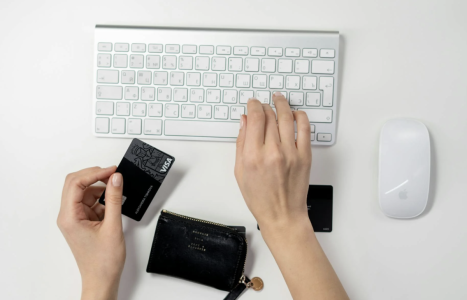Is your credit card safe? How scammers are mimicking top brands to steal your money
By
Veronica E.
- Replies 0
If you’ve spotted an unbelievable deal online, you’re not alone.
Scammers are now creating convincing fake websites that mimic trusted retailers, luring in shoppers with deep discounts and urgency tactics.
These traps are designed to steal your credit card details—without ever delivering a product.
Even the most careful consumers are falling for them.
That’s why staying informed and cautious while shopping online is more important than ever.

A deal that looks real—but isn’t
You’re scrolling online and spot a flash sale from a name you recognize—Apple, Brooks Brothers, maybe even Omaha Steaks.
The site looks polished, the checkout page has the right logos, and the discount feels too good to pass up.
But once you’ve entered your payment info, the product never shows up.
Even worse, your credit card is suddenly charged for purchases you didn’t make.
This scam isn’t isolated.
Cybersecurity firm Silent Push warns that thousands of fake websites are running right now—many operated by organized criminal groups overseas.
They’re cloning the look of major retailers down to the last detail, sometimes changing just one letter in the web address to fool you (like “harborfrieght.shop” instead of “harborfreight.com”).
Also read: Are your store deals real? Scammers are targeting crafters with this sneaky trap
How they trick you
These scammers are good—really good. Here’s how they operate:
Also read: She lost $17,500 to a bitcoin ATM scam—what happened and how to stay safe
The scope of the scam
This isn’t small-time theft.
The FBI says Americans lost a record $16.6 billion to online scams in 2024—a 33% jump from the previous year.
Fake storefronts are multiplying every week, and enforcement agencies are struggling to keep up.
Also read: Protect your money: The shocking scam that forced Walmart to issue refunds
Your safety checklist for online shopping
Here are steps you can take to stay safe while shopping online:
1. Double-check the URL
Look closely at the website address. Is there a subtle misspelling? Does it start with “https” (not just “http”)? That “s” means your connection is secure.
2. Confirm the seller’s identity
Go directly to the brand’s website by typing it in manually. Avoid clicking on random ads.
Look for contact details and return policies—fake sites rarely offer these.
Also read: Paws off our savings! The crypto scam preying on vulnerable seniors
3. Read reviews—carefully
Search for the site’s name on independent review platforms. Be skeptical of websites with only glowing (and vague) reviews or none at all.
4. Don’t fall for urgency
Scammers want you to rush. Ignore timers, pop-ups, and “flash sale” messages unless you’re certain the site is legit.
5. Pay the smart way
Avoid using gift cards, wire transfers, or cryptocurrency.
Use credit cards when possible—they offer stronger fraud protection than debit cards.
6. Trust your gut
If something feels off—like a price that seems “too good to be true”—you’re probably right. Walk away.
Also read: How a disabled woman lost her last $400 to an expiry scam—protect your money now!
What to do if you’ve been scammed
If you realize you’ve given your information to a fake site, act fast:
Online shopping can be safe and convenient—but only if you know what to watch out for.
At The GrayVine, we believe the more you know, the more power you have to protect yourself and your loved ones.
Share this article with friends, neighbors, and family members who shop online—it could save them from a costly mistake.
Read next: What to do if your email gets hacked—and how to lock it down for good

Have you ever run into a fake website or been tricked by a scam? What are your go-to tips for safe online shopping? Leave a comment below—your experience might just help someone else avoid getting scammed.
Scammers are now creating convincing fake websites that mimic trusted retailers, luring in shoppers with deep discounts and urgency tactics.
These traps are designed to steal your credit card details—without ever delivering a product.
Even the most careful consumers are falling for them.
That’s why staying informed and cautious while shopping online is more important than ever.

Scammers are getting more sophisticated—learn how to spot the signs before they steal your information. Image Source: Pexels / cottonbro studio.
A deal that looks real—but isn’t
You’re scrolling online and spot a flash sale from a name you recognize—Apple, Brooks Brothers, maybe even Omaha Steaks.
The site looks polished, the checkout page has the right logos, and the discount feels too good to pass up.
But once you’ve entered your payment info, the product never shows up.
Even worse, your credit card is suddenly charged for purchases you didn’t make.
This scam isn’t isolated.
Cybersecurity firm Silent Push warns that thousands of fake websites are running right now—many operated by organized criminal groups overseas.
They’re cloning the look of major retailers down to the last detail, sometimes changing just one letter in the web address to fool you (like “harborfrieght.shop” instead of “harborfreight.com”).
Also read: Are your store deals real? Scammers are targeting crafters with this sneaky trap
How they trick you
These scammers are good—really good. Here’s how they operate:
- Fake sites: They copy design, branding, and wording from real retailers.
- Search engine manipulation: They get fake stores to appear high in search results for things like “cheap designer bags” or “discount work boots.”
- Social media ads: Fake promotions on Facebook and Instagram direct shoppers to their fraudulent sites.
- Rush tactics: They use timers, pop-ups, and “limited stock” messages to pressure you into fast decisions.
- Fake checkout options: They’ll show icons for Apple Pay or PayPal, but your card might be processed through a shady third party instead.
Also read: She lost $17,500 to a bitcoin ATM scam—what happened and how to stay safe
The scope of the scam
This isn’t small-time theft.
The FBI says Americans lost a record $16.6 billion to online scams in 2024—a 33% jump from the previous year.
Fake storefronts are multiplying every week, and enforcement agencies are struggling to keep up.
Also read: Protect your money: The shocking scam that forced Walmart to issue refunds
Your safety checklist for online shopping
Here are steps you can take to stay safe while shopping online:
1. Double-check the URL
Look closely at the website address. Is there a subtle misspelling? Does it start with “https” (not just “http”)? That “s” means your connection is secure.
2. Confirm the seller’s identity
Go directly to the brand’s website by typing it in manually. Avoid clicking on random ads.
Look for contact details and return policies—fake sites rarely offer these.
Also read: Paws off our savings! The crypto scam preying on vulnerable seniors
3. Read reviews—carefully
Search for the site’s name on independent review platforms. Be skeptical of websites with only glowing (and vague) reviews or none at all.
4. Don’t fall for urgency
Scammers want you to rush. Ignore timers, pop-ups, and “flash sale” messages unless you’re certain the site is legit.
5. Pay the smart way
Avoid using gift cards, wire transfers, or cryptocurrency.
Use credit cards when possible—they offer stronger fraud protection than debit cards.
6. Trust your gut
If something feels off—like a price that seems “too good to be true”—you’re probably right. Walk away.
Also read: How a disabled woman lost her last $400 to an expiry scam—protect your money now!
What to do if you’ve been scammed
If you realize you’ve given your information to a fake site, act fast:
- Contact your bank or credit card company and cancel the compromised card.
- Monitor your accounts for unusual charges.
- Report the scam to the FBI’s Internet Crime Complaint Center at ic3.gov.
- Change your passwords, especially if you reused them on other sites.
Online shopping can be safe and convenient—but only if you know what to watch out for.
At The GrayVine, we believe the more you know, the more power you have to protect yourself and your loved ones.
Share this article with friends, neighbors, and family members who shop online—it could save them from a costly mistake.
Read next: What to do if your email gets hacked—and how to lock it down for good
Key Takeaways
- A widespread credit card scam is targeting online shoppers with fake websites that mimic popular retailers, aiming to steal payment details without delivering products.
- These scam sites often surface through social media links, misleading ads, or even top search results, with many run by overseas criminal networks.
- Tactics include slight misspellings in URLs, fake checkout logos, and high-pressure sales techniques that push users to act quickly.
- To stay safe, experts advise shopping directly through verified websites, using credit cards, checking for HTTPS security, and remembering that unbelievable deals are usually a trap.
Have you ever run into a fake website or been tricked by a scam? What are your go-to tips for safe online shopping? Leave a comment below—your experience might just help someone else avoid getting scammed.






